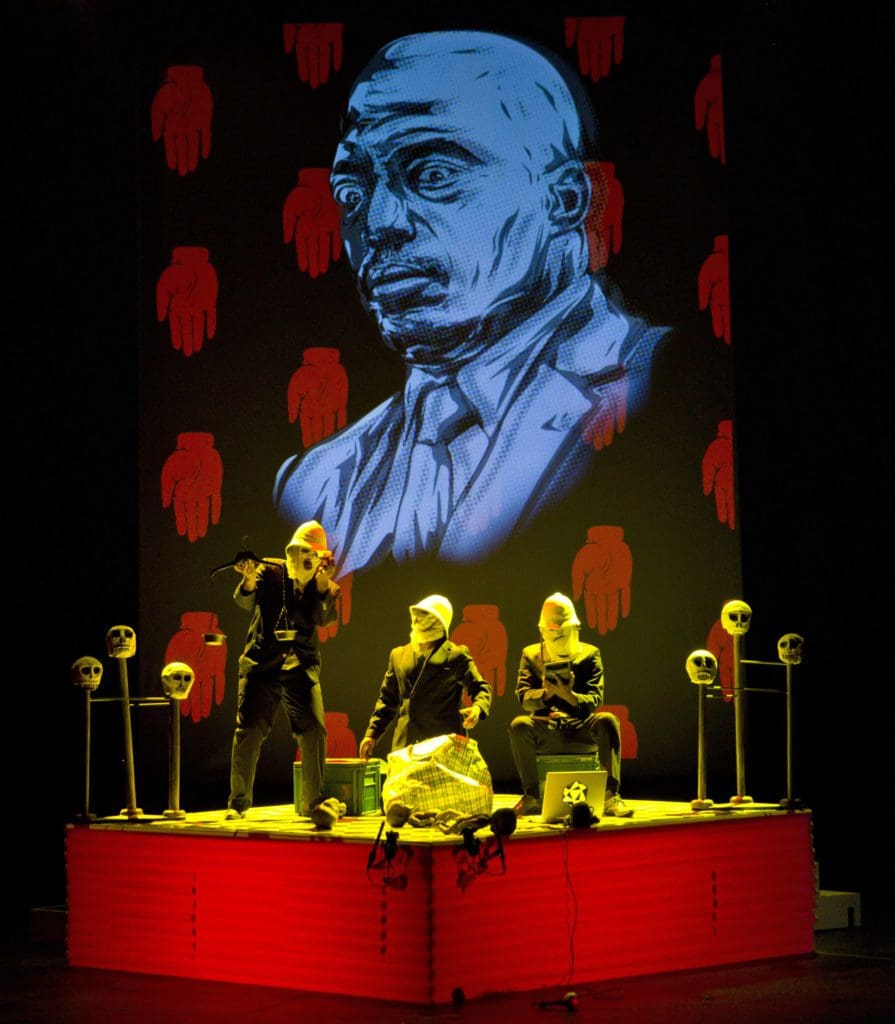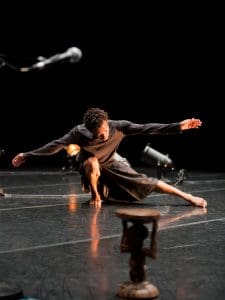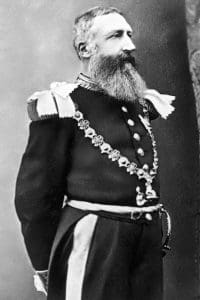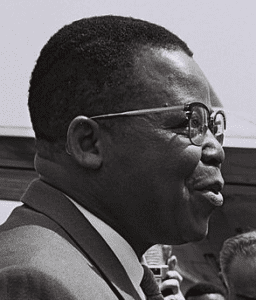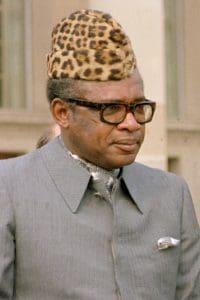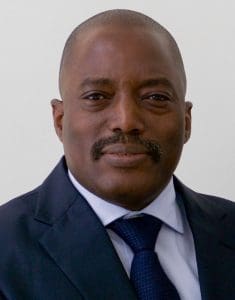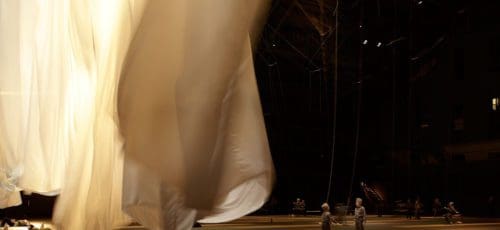A Timeline of Congolese History
Above: From Macbeth (photo by Nicky Newman)
Next week FringeArts will proudly present two performances that engage the history of the Democratic Republic of the Congo through radically different perspectives and means of storytelling.
Le Cargo is renowned Congolese choreographer Faustin Linyekula’s first and only solo dance piece, created in celebration of the tenth anniversary of his Kinshasa based performance company Studios Kabako. The piece finds Linyekula adopting the roles of storyteller and dancer in tandem as he leads his audience on an arresting and deeply personal journey to his homeland, a country marked by decades of violence and unrest, in search of a dance from his childhood that has since been erased.
Macbeth is South African company Third World Bunfight‘s reimagining of Verdi’s titular opera. Set in the DRC and centered on brutal warlord General Macbeth and his ambitious wife, the opera brings the classic tale of greed, tyranny, and corruption to postcolonial Africa with the help of its astonishingly talented cast and stunning set designs that make the show just as much a work of visual art as it is of theater. Be sure to check out the many ancillary events related to the show as well.
In anticipation of these exciting performances, dramaturg Meghan Winch has provided FringeArts with a timeline of Congolese history—from the 13th century to present day—sourced from Georges Nzongola-Ntalaja’s book The Congo from Leopold to Kabila.
1400 – 1885
The Kongo kingdom of Central Africa is a prosperous, major force in the region based in agriculture and trade. 1482 brings the Kongo’s first contact with European explorers. Over the course of the next 400 years, the kingdom breaks up into autonomous chiefdoms.
1885 – 1908
King Leopold II of Belgium claims the Congo as his own private territory. The Congo is a major source of rubber and other valuable minerals, and the Congolese people are subject to a number of atrocities in order to harvest and export these resources. Beginning in 1891, several local uprisings are fought and repressed, including the Shi kingdom’s resistance (1900-1916) and the Luba-Katanga kingdom’s rebellion (1907-1917).
1908 – 1960
King Leopold cedes his claim to the Congo to Belgium, making it a colony. The effort to assimilate educated Africans into European culture includes the establishment of the “social merit card” and the “matriculation system,” which amounted to making a tiny Congolese elite into honorary Europeans. Established in 1950 to promote Kongo language and culture, Abako (the Alliance of Bakongo) eventually becomes a political force supporting Congolese independence. Workers’ strikes and anti-colonial protests culminate in a 1959 Kinshasa uprising for independence, leading to more rebellions and war throughout the Belgian-controlled region. Belgium agrees to complete independence for the Congo as of Jun 30, 1960.
1960 – 1961
National elections are held; Joseph Kasa-Vubu becomes head of state and Patrice Lumumba becomes prime minister. By the end of the year, the provinces of Katanga and South Kasai have seceded, massacres have occurred to quell rebellion, and Chief-of-Staff Joseph Désiré Mobutu has staged a military coup. Lumumba is dismissed, then arrested and executed. A new government is arranged by the US and UN for national unity.
1962 – 1965
Political unrest and violence continues; the secessions are put down, but rebellions and civil war spring up in Kwilu and the east. UN forces leave the region, and US and Belgian forces coordinate to end the rebellions. In 1965, free elections are held and results upheld.
1965 – 1997
Five months after the elections, Mobutu stages his second coup and becomes leader of the Congo, which he renames “Zaire” in 1971. He rules as a dictator for the next 32 years, taking control of all foreign-owned mining companies, executing dissenters, and ordering massacres and purges of university students and army officers. His rule is characterized by enforcing “Zairianization,” which claims to support authenticity and prescribes behaviors and dress codes intended to make Zaire less “foreign” and to consolidate his own power.
1997
The Alliance of Democratic Forces for the Liberation of Congo (AFDL) succeeds in capturing Kinshasa with Ugandan and Rwandan support, overthrowing Mobutu and installing Laurent-Désiré Kabila as president. He restores the country’s official name of “Democratic Republic of the Congo,” established by the Luluabourg Constitution in 1964.
1998 – 2001
Kabila sends his Rwandan chief-of-staff and other AFDL officials back to their home countries. War breaks out between Congolese forces loyal to Kabila and those allied with Rwandan and Ugandan troops. Angola, Zimbabwe, Namibia, and Chad intervene on Kabila’s behalf; in July 1999, the belligerents sign the Lusaka agreement to end hostilities. The city of Kisangani becomes a central site of fighting between Rwandan and Ugandan forces and is destroyed, killing hundreds of civilians.
2001 – 2006
President Kabila is assassinated by one of his bodyguards. His son, Joseph Kabila, is chosen by the late president’s entourage as the new leader and assumes power. Despite a peace deal and the arrival of UN forces, conflict continues between his government and Ugandan and Rwandan forces until 2003. A transition regime is set up following an Inter-Congolese Dialogue held in South Africa to prepare for the return to a multiparty democracy.
2006 – Present
The first multi-party election since 1965 occurs in 2006. Joseph Kabila wins the presidency, after voters approve a new Congolese constitution. Despite massive irregularities, Kabila is declared the winner of the 2011 elections. The next election is scheduled for late 2016, but may be delayed. Opposition voices claim Kabila wants to remain in power beyond the two terms the constitution allows. Armed conflict continues, particularly in the east.

